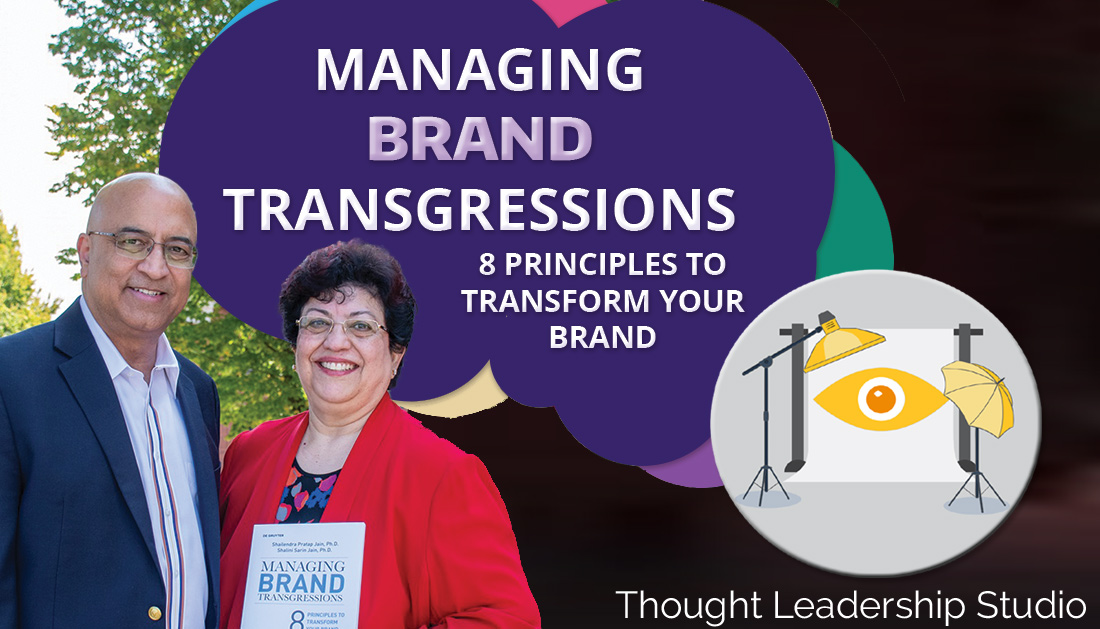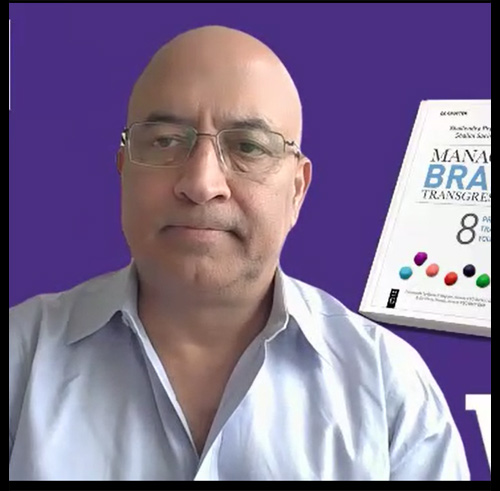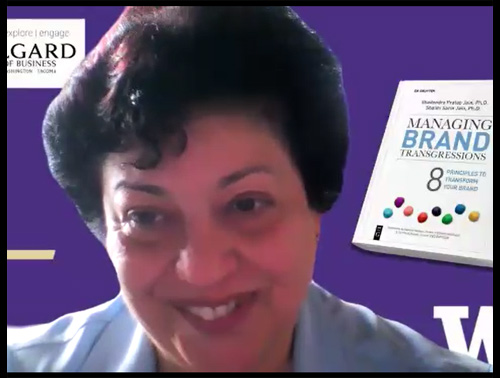Thought Leadership Studio Podcast Episodes:
Turning Brand Crises into Opportunities with Drs. Shalini and Shailendra Jain
Episode 82 - Navigating Brand Transgressions: Principles for Accountability, Transparency, and Long-Term Success from the Authors of Managing Brand Transgressions

#branding, #communication, #consulting, #entrepreneurship, #influence, #interview, #interviews, #leadership, #marketing, #marketingstrategy, #organizationalculture, #paradigmshifts, #thoughtleadership, #thoughtleadershipmarketing
Or Click here to listen or subscribe on appWhat this episode will do for you
:- Understanding Brand Transgressions: Gain insights into what constitutes a brand transgression and why it poses a significant threat to companies.
- Leadership in Crisis: Discover the crucial role leaders play in managing brand crises, making tough choices, and prioritizing long-term values over short-term profits.
- Rebuilding Trust After a Crisis: Learn from real-world examples, like Tylenol and Starbucks, on how brands can take responsibility, apologize, and rebuild trust with their customers.
- The Power of Accountability and Transparency: Explore the importance of building a company culture that values accountability, transparency, and customer care to safeguard long-term success.
- Practical Strategies for Managing Crises: Get actionable insights from the book "Managing Brand Transgressions" with eight principles for turning crises into opportunities for growth.
- Lessons for Entrepreneurs and Thought Leaders: Understand how to foster a culture of integrity and ethics from the early stages of business, with advice for both large organizations and small startups.
Dr. Shalini Jain and Dr. Shailendra Jain.
In this episode, I’m excited to introduce Dr. Shalini Jain and Dr. Shailendra Jain, global thought leaders in marketing, brand management, and business ethics.
How is brand management relevant to Strategic Thought Leadership (STL)?
Strategic Thought Leadership is about guiding and influencing others to embrace new perspectives that better align with principles and values. In the business world, this means handling crises with integrity and turning challenges into opportunities for growth.
Dr. Shalini Jain and Dr. Shailendra Jain, both distinguished business professors and co-authors of *Managing Brand Transgressions: Eight Principles to Transform Your Brand*, bring their wealth of academic and real-world experience to the forefront. Their book delves into how brands can navigate crises with accountability, transparency, and a focus on long-term success, featuring pivotal examples like Tylenol and Starbucks.
In our conversation, they share insights into the tough choices leaders must make when balancing values and profit. We explore how businesses can rebuild trust after a brand crisis and the principles that guide ethical leadership.
They also offer practical strategies from their research on managing brand transgressions, providing valuable recommendations for entrepreneurs, executives, and thought leaders to foster a culture of accountability and customer care.
Drs. Shalini and Shailendra Jain leave us with key takeaways on how to prioritize values while driving business success, making this an episode rich in lessons for all who seek to lead with integrity.
Some of the Drs Jains' coordinates:
Curated Transcript of Interview with Dr. Shalini Jain and Dr. Shailendra Jain
The following partial transcript is lightly edited for clarity - the full interview is on audio. Click here to listen.
Chris McNeil: I'm Chris McNeil, with Thought Leadership Studio, and I'm sitting here across Zoom with Dr. Shalini Jane and Dr. Shailendra Jane, who are renowned business professors in global thought leaders in marketing and brand management. What a great topic.
They co-authored managing Brand Transgressions - 8 Principles to Transform your Brand, a pivotal book addressing the challenges of brand crises. The work offers strategic insights on mitigating brand transgressions, responding effectively when crises hit, and turning these challenges into opportunities for brand transformation, drawing on cases like Boeing and Volkswagen.
I remember Dieselgate as well. I actually drive a diesel car, so I'm close to that one too. They emphasize proactive strategies to ensure brand resilience and long-term success. So welcome, great to have you here.
Crisis as a Catalyst: How Brands Can Emerge Stronger
 Dr. Shailendra P. Jain: Thank, thank you, Chris for having us here.
Dr. Shailendra P. Jain: Thank, thank you, Chris for having us here.
Chris McNeil: My pleasure. So to give our listeners a little context for where you're coming from, was there a pivotal moment or series of events or change that set you on the path of teaching about branding and managing brand transgressions that's led you to where you are now that you can tell the listener about, to give them some context?
Dr. Shailendra P. Jain: You want to go Shalini?
 Dr. Shalini S. Jain: No, go ahead.
Dr. Shalini S. Jain: No, go ahead.
Dr. Shailendra P. Jain: So thank you for Chris again for having us and for asking that I think critical question. So the most immediate context which triggered the start of this book was Covid.
And so we were quarantined and it was a bit frustrating for us, just like from millions and billions of people. And after about a couple of months of playing victim, we realized that we had to create value even though we can't step out of our homes. So we started thinking about what might be some way to create value for the planet. And the idea that came up was why don't we integrate our individual research interests into some manuscript? The idea of a book had not yet firmed up and some of my research is in brand strategy and some of Shalini's research is in business ethics and corporate social responsibility.
And we found a sweet integrative spot of brand transgressions. I have a couple of papers on brand transgressions and that's how the idea of the book started though I would imagine that our individual experiences at work and in life ultimately Ed at that point in time, because I have been in industry working on brands and I've been an academic teaching marketing while Shalini is very passionate about ethics and corporate social responsibility from a very, very long time. So perhaps the seeds were born from our past lives. So that's what my perspective is over to Shalini.
Dr. Shalini S. Jain: Yeah, no, let's go to the next question. I think that kind of sets the stage.
Chris McNeil: Excellent, excellent. So you've got your foot in both the business world, but in academics as well. Is that true for both of you?
 Dr. Shalini S. Jain: Yes, yes.
Dr. Shalini S. Jain: Yes, yes.
Chris McNeil: That's excellent. Okay, so here's a wild question. What is the state - in your perception - of business ethics today ... large corporations?
And is it good, bad, in the middle? How do you perceive it from your perspective?
Dr. Shalini S. Jain: I think it is driven largely by consumers and increasingly we are seeing, particularly in the Gen Z and the millennials, they are expecting to do business with companies that have the values that align with theirs, and they choose actively not to purchase products from companies whose values don't align with theirs.
They also make those choices when it comes to picking jobs. And so I would argue that businesses are in a position where it's not about what they want, but really responding to consumer expectations. And the business roundtable has also acknowledged recently that they serve not just shareholders but all stakeholders, particularly communities and consumers and the environment. So this is an increasingly important topic for businesses to have social value and a social cause. So of course to make money but to do so responsibly without harming anyone.
Balancing Values and Profit: Contrasting Lessons from Patagonia and Boeing
Chris McNeil: What's an example of a business that is based on strong values?
Dr. Shalini S. Jain: So in our book we talk about, one of the principles in our book is about building brand authenticity. And the case that we picked is that of Patagonia.
It was founded on the principle of saving the planet. And every action that the founder Mr. Ard took was towards that end, even if it meant a higher cost for producing products. The revolutionary position they took perhaps on during this Thanksgiving period when retailers are customers to buy products, they had that famous ad that said don't buy this product, encouraging customers to think responsibly about sustainability. And so we in our research have found that they have walked the talk on sustainability.
And in fact, in his own words, and I'm paraphrasing, he says that people may think I'm eccentric, but every time that I have chosen to a pro-environmental strategy for my company, a profit has come and it has increased.
Chris McNeil: I love that.
Dr. Shailendra P. Jain: And he has described that this is not either or, but you can do both and be successful.
Chris McNeil: You can both be oriented around values, higher values that unify, like taking care of the environment and be profitable.
Dr. Shalini S. Jain: Yes.
Chris McNeil: Yet at the same time we see companies sacrifice their stated values for short-term profit and get caught at it. And since your book is titled Managing Brand Transgressions, what's an example of a company that's had a brand transgression where they didn't live up to these kinds of values that they should represent?
 Dr. Shailendra P. Jain: So the case that we were talking about before we started recording was that of Boeing. So we have one half of a chapter on Boeing covering the start of what we thought was what we believe is a huge transgression where two of their aircraft crashed and we are not the only ones. There's a lot of media coverage around it.
Dr. Shailendra P. Jain: So the case that we were talking about before we started recording was that of Boeing. So we have one half of a chapter on Boeing covering the start of what we thought was what we believe is a huge transgression where two of their aircraft crashed and we are not the only ones. There's a lot of media coverage around it.
And there's an entire book somebody has published about the Boeing debacle. And the general conclusion seems to be that Boeing compromised by focusing on short-term profit and seeking competitive advantage over Airbus. And the story goes that after Boeing was merged with McDonald Douglas, the culture of the company changed from being extremely focused on creating a great safe product to maximizing profit. And as we know, profit can be maximized by increasing revenues and or decreasing costs. That's a pretty simple equation.
And one of the things that Boeing apparently did was to compromise on sourcing of some of its parts by buying lower priced products than they were trying to save cost in the process.
And that has been held responsible for the situation that Boeing faces itself today and both the 7 3 7 max crashes. And this year, January of 2024, there was that incident where the door of an Alaskan airline flight blew open midair and there's a lot of research that has been done, a lot of inquiry and investigation. And more recently they've had a new CEO who's going to be taking over.
They've had three CEOs change hands over the last three years since the start of this problem clearly showing that the company's trying to find a solution to the problem. So here is a case which illustrates the answer to your question. Tell me of a case where the company compromised on values by focusing on short-term profit maximization.
Doing the Right Thing: Lessons from Tylenol's Crisis Response
Chris McNeil: So what's the solution when your decision maker or a large organization and your company has stated universally accepted higher values like safety for instance, taking care of its customers regarding them at the highest, but you're also faced with meeting a budget and how do you center yourself on these values in the turbulent environment within a large organization or even a small organization where you have follow the value or do what's easy for right now?
Dr. Shalini S. Jain: So the first principle, the foundational principle of our book talks about doing the right thing. And we use the example from the 1980s of Tylenol. So in the 1980s, if you were, I don't know if you were around or young old enough at that time ...
Chris McNeil: I was definitely old enough ...
Dr. Shalini S. Jain: But there was an instance of seven deaths where people who had ingested had Tylenol died.
Chris McNeil: I remember.
Dr. Shalini S. Jain: And Tylenol at that time was the leading analgesic with about 40% market share. And even though there was no social media at that time, the media publicity particularly, it was pretty negative, it was said by some people that Tylenol couldn't recover from this. There was nobody who was ever going to put a Tylenol in their mouth ever again. And so the CEO of Tylenol at that time, James Burke made this choice first, how can we save the customer and second, how can we save the company?
And that of course I think in any company would have faced resistance, but that was the position he took because he felt this was the only way actually to save the profit and the company. And at that time they didn't know what was the source or how this happened, but he still took that stand. And so he did the right thing by taking accountability even though at that time he didn't know if it was something that was internal or something that was external.
 But he took that stand and then of course they cooperated with the regulators in an unprecedented way. They were transparent in their communication with the media and the public. Mr. Burke went on national television explaining to people not to buy Tylenol till they got to the bottom unusual actions by A CEO in a public space saying, please don't buy my product till we get to the bottom of this.
But he took that stand and then of course they cooperated with the regulators in an unprecedented way. They were transparent in their communication with the media and the public. Mr. Burke went on national television explaining to people not to buy Tylenol till they got to the bottom unusual actions by A CEO in a public space saying, please don't buy my product till we get to the bottom of this.
So these were very in our understanding and research and our belief also was a gold standard of how a company responds even if they didn't know what happened. And so then of course subsequently it was investigators found that there was no problem in their supply chain or product and they looked at various issues about disgruntled employees, but meanwhile Tylenol's response.
So the next thing I think there was another incident in California and at that time, Jamesburg took the decision to take off, recall all Tylenol products nationwide, and they stopped the manufacturing and the sale of Tylenol and people within the company amongst his perhaps legal counsel. And C Street felt that was an overreaction, but again, his position was we cannot have even one more person die. And so we need to take this position. So at the end of it, actually even today, it's a mystery how this happened.
But because of Tylenol's response, very proactive, very public, very engaged, very empathetic, sympathetic transparent, consistently transparent, they were actually perceived as a victim by the consumer and garnered a lot of support from consumers. And of course this prophecy that no one would ever put a Tylenol in their mouth again is history because it's market share is back to its original levels if not higher.
Growth at Any Cost: The Temptation and Consequences for Brands
Chris McNeil: What a brave stance to take though, in an environment such as that with stockholders pressure - or perhaps from a board of directors. And as things can be different in smaller companies with the founder who's the guiding light and who doesn't necessarily even have a board of directors or stockholders to be accountable to.
But even as such cases, there's brand transgressions because we live in a society that values material consumption and values growth at all costs in some cases. Is growth at all cost one of those contradictory values that sometimes gets in the way of doing the right thing?
Dr. Shailendra P. Jain: Most certainly. Most certainly it does. Was that a question?
Chris McNeil: Yes, it was.
 Dr. Shailendra P. Jain: Yeah, absolutely. And again, not a dead horse not to beat an injured horse. Boeing's case was one where they were fiercely competitive with Airbus. They wanted some orders which Airbus was probably going to snare. And so their response, and that's not a small organization, okay, you are talking about a small organization, Boeing is a huge organization,
Dr. Shailendra P. Jain: Yeah, absolutely. And again, not a dead horse not to beat an injured horse. Boeing's case was one where they were fiercely competitive with Airbus. They wanted some orders which Airbus was probably going to snare. And so their response, and that's not a small organization, okay, you are talking about a small organization, Boeing is a huge organization,
But I think the pressures are similar when growth at any cost is the driving principle where growth at any cost implicitly or explicitly implies I don't care about what is the principle underlying this. I want to grow, even if it means I'm going to take some steps which are not going to be seen as appropriate and which could potentially be transgressive, which could potentially come back and haunt me, I will take the steps later.
Let me grow for now. So I think these are human thoughts and sometimes the profit pressure and if venture capitalists are backing your business, you need to show money quickly, need to show the profit and so on and so forth, break even quickly and so on. So yeah, those pressures are there. Those pressures are there. And you do not have the council from a board of directors as you rightly said. So the company, Patagonia was a small company when it started and we cover the history of this company. It was a small company, but we think one of the principles in the book is about leadership. Leadership sets the tone. So at that size we think it's a great opportunity to dig roots and be extremely principled right from the word go.
And because that's where the DNA of the organization starts developing, and the leadership will guide the future generations that are going to be part of this ecosystem. So if the compromise starts at the early stage and there is no stemming it, then potentially the culture of the company will evolve in accord. And over time people will I those values, the employees will imbibe those values and then they will say, yeah, shortcuts are okay, we have to grow at any costs.
The Courage to Lead with Principles: A Path to Long-Term Success
So to respond directly to your question, I think as a small organization you are in an advantageous position because you can turn things around from a principal's viewpoint extremely quickly. You can take a step back and say, I need to follow certain guidelines and principles because the culture is being defined right at this point in time. So the larger organizations don't get a free pass, but there is a little more understanding because they're huge and turning them around is going to take time. Boeing is over a hundred years old now, turning Boeing around.
The new CEO has said that I will increase transparency, we will go back to our roots, we will become an engineering organization and so on and so forth. All these things we talk about in the book and we are very happy. He's saying that it'll take time for Boeing to turn things around even though his heart is in the right place, but it'll take time for him. So I think smaller organizations have an opportunity to start early in terms of doing the right thing.
Chris McNeil: I love that it is like as the twig is bent, so the tree will grow. So that might impact a founder's decisions on what venture capitalists to accept money from if they take a strong principle stance and say, "This is what the company's about and this is what we stand for, do you support that? If you don't, that's okay. We'll find our money somewhere else."
But that's a brave thing to have to say sometimes when someone's dangling a $50 million investment in your startup in front of you.
Dr. Shailendra P. Jain: That's right.
Chris McNeil: It seems to take courage.
 Dr. Shailendra P. Jain: It does take courage. And our principles that we outline in the book, we do not profess to say that every principle is going to lead to the spot of gold. Literally speaking, we do say that there will be some roadblocks, there will be obstacles and you will need to make some tough choices. But our research across 25 plus case studies and 50 years of business and pretty much every country we cover in this book shows that when you do make those tough and courageous choices, great outcomes result.
Dr. Shailendra P. Jain: It does take courage. And our principles that we outline in the book, we do not profess to say that every principle is going to lead to the spot of gold. Literally speaking, we do say that there will be some roadblocks, there will be obstacles and you will need to make some tough choices. But our research across 25 plus case studies and 50 years of business and pretty much every country we cover in this book shows that when you do make those tough and courageous choices, great outcomes result.
So that's really what, so we are not at all oblivious that companies exist to make money. Most of them exist to make money. If they don't make money, their survival is at stake. And we say that very clearly. We are not against profit, but we believe and we are not even trying to profess a faith viewpoint, religious viewpoint. It's actually pretty clinical and hardnosed, when you do the right thing, you will go into the right direction, you will achieve the right outcomes if you don't, and we have a number of cases if you don't, all bets are off.
And we pepper that statement with quite a few cases where the company took a short-term decision and tried to hush the negative situation or blatantly misrepresent or lie, hoping that they'll come out of the situation because people may not notice, but they were proven to be wrong. Volkswagen is right now almost $40 billion poorer because of that emissions cheating scandal.
And we now know that then CEO knew that this was going to, this was being done. It was his explicit approval because of which the emissions cheating device was installed in 500,000 plus Volkswagen cars and now he's being hunted for criminal wrongdoing. So sooner or later this will catch up with you.
Chris McNeil: Well, I love the belief system that being in alignment with higher values actually does lead to more profit even when it doesn't necessarily look like that with a shortsighted reductionist point of view. And this reminds me of some things I've seen in systems thinking. When you back up and you look at the whole system, realize your business is part of an ecosystem, an organic whole driven by customers.
Without customers, we don't have businesses, they pay for lunch, they pay the bills, especially with customers that are value centered, it seems like the customer demand, as you mentioned Selena, that customer demand for values can drive businesses to be more values oriented, even if they just have a profit motive, then should we not align with the values our customers have?
And to me, this podcast is about thought leadership. And to me doing thought leadership strategically is about aligning with higher values, often higher values that your competitors miss with a new mental model for the marketplace that you can satisfy these values this way through our new perspective that we're bringing. So I think it can drive innovation. Sometimes when you notice in unmet value in a product or service category, it points to light towards opportunity for positive persuasion to get people on board. But then you have to live up to that obviously, and living up to that isn't always easy.
Dr. Shalini S. Jain: I was reading about your podcast and I saw the first line and I thought it aligns so well with our book, which says, give the people what they want. And the people nowadays are expecting values, social and environmental values from corporations. And then you also say, the customers always right? And so how can we dignify the life of each customer?
Boeing took some time and even apologizing and actually didn't meet with the victim families versus Starbucks in its famous Philadelphia incident of racial profiling, the CEO flew across the country within 48 hours to personally apologize to the two victims.
Chris McNeil: That's honorable, yes.
Dr. Shalini S. Jain: So again, treating each life with dignity and that the customer is right and we must give the people what they want because social media was the frenzy. The negative publicity was at its peak about that Starbucks was a racist organization.
***************************************
The transcript is lightly edited for clarity and is a partial transcript- the full interview is on audio. Click here to listen.
***************************************
Free Stuff and Offers Mentioned in Podcast
***************************************
***************************************